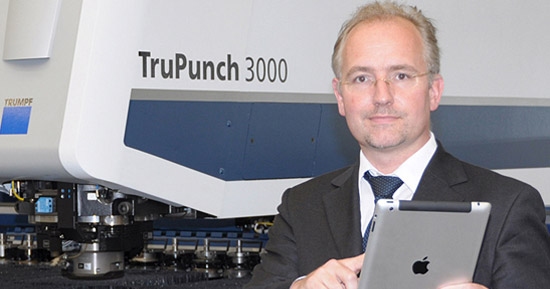Changing manual manufacturing: Operator augmentation with InspecVision’s GAV System
Read how InspecVision’s breakthrough system doesn’t replace workers—it gives them X-ray vision and a photographic memory.
Welcome to Headland Technology Client log in
Whether you’re after a machine, spare part, power tool, or need to book a service call Headland will help you find the right solution in a timely manner.
Fill out the form below and the relevant expert will be in touch with you shortly.
TRUMPF Express Magazine speaks to Klaus Bauer, Head of System Development Fundamental Technology at TRUMPF Ditzingen to find out the answers.
The term describes the intelligent interlinkage of all the production systems. Industry 4.0 — also referred to as the fourth industrial revolution — will have a similar impact on production as did the first three industrial revolutions — mechanisation, electrification, and computerisation. It is essentially a question of making production more efficient, cost-favourable and flexible, and in that way to retain profitability.
The goal is to produce a one-off item as easily as one in a mass production run.
The manufacturer of the item to be produced can be influenced at any point in time. The Internet also makes it possible for the ultimate customer to impose individual requirements almost in real time. The prerequisite here is that the production line be extremely flexible and that it can turn out a wide variety of products.
The machines are largely self-configuring while information is stored not only centrally, but also at the product being manufactured.
This could include data on the properties of the feedstock material, describing how it can be worked. In the case of a complex product, this might also include information about which machine has already worked the product and which processing steps are required before completion.
The workers will be very consciously integrated into the process. We need people in manufacturing since machinery — neither now nor in the future — can offer a substitute for their intuition and intelligence. At the same time, we attach great importance not to having just experts in the plant. It is important to insulate the people on the line from the complexity of these new systems. That is a major challenge. As the systems in the background become ever more complex, then we have to improve the systems used for control and interaction. The human being is supposed to direct and organise, without having to master all the complexity involved.

TRUMPF has, from the very beginning, been a member of the German Federal Government’s working circles on Industry 4.0 and, as well, is on the steering and executive committee for “Platform Industry 4.0”, organised by the VDMA, ZVEI and BITKOM. In this way, we can actively influence research work and the implementation of the results. In addition, we are a partner in the CyProS (cyberphysical production systems) project being conducted by the Federal Ministry of Education and Research.
Among the things worked out here are the reference architecture for intelligent networking. In our own products, too, we are showing even today the directions that future developments might take. Examples are iPad apps with which production can be monitored from a remote point.
Industry 4.0 does not mean that we will be tearing down and rebuilding anew. Existing production systems will be upgraded a step at a time. The steps are more evolutionary in nature and only in retrospect will we see how many different things have changed.
See the complete interview with Klas Bauer. Download the latest edition of TRUMPF Express, Laser Community or TruServices Journal – Click the link below.
Whether you’re after a machine, spare part, power tool, or need to book a service call Headland will help you find the right solution in a timely manner.
Fill out the form below and the relevant expert will be in touch with you shortly.
